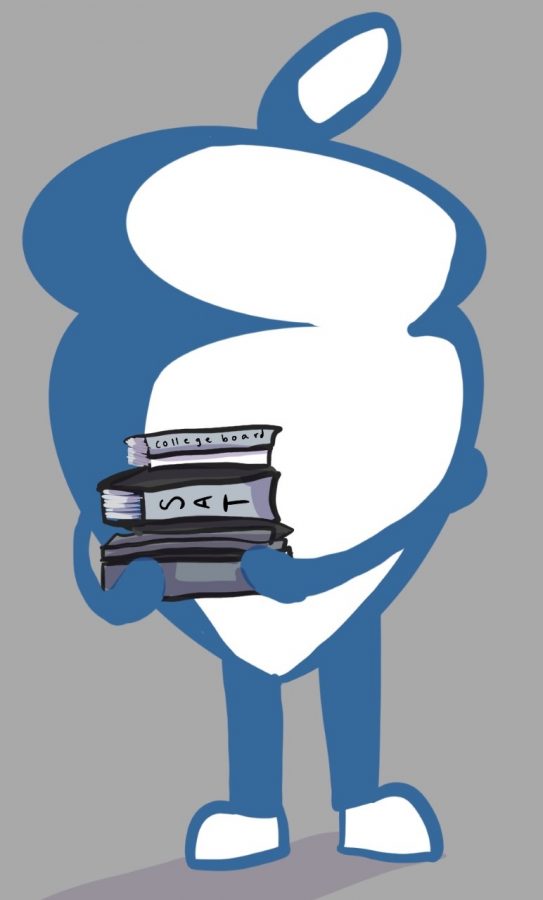A College Board Blunder
The College Board has recently been a center of criticism for its decision to make Subject Tests unavailable.
Every month or so, students across the country flock to high schools to take the highly dreaded, nerve-wracking standardized test, the SAT. A movement has swept colleges in recent months, however, and many schools have become test-optional, or test-blind altogether. This can be attributed, in part, to the coronavirus pandemic, which has made it more difficult for students to take the exam: test-sight closures, cancellations, and modifications in schooling as a whole have contributed to the dilemma, and thankfully, colleges recognize these hurdles.
In response, the College Board, the all-powerful corporation that administers and oversees the SAT, PSAT, AP, and SAT II, along with other tests, has decided to lessen the testing burden and “reduce demands” even more — or so it claims. SAT IIs, also known as Subject Tests, have been suddenly discontinued, leaving thousands of students wondering: What do I do now?
Subject Tests were first introduced in the mid-20th century and have been available in a variety of topics for years, including but not limited to World History, Literature, Physics, Math, and Japanese. Students chose to take the optional exams because they bolstered college applications, provided opportunity to gain college credit, and, until recently, have been a requirement for some highly-selective universities.
The College Board claims that the all-too-sudden cancellation was decided based on the tests’ declining necessity due to the expansion of Advanced Placement (AP) exams and their availability to low-income and minority students. “As students and colleges adapt to new realities and changes to the college admissions process, the College Board is making sure our programs adapt with them,” stated the College Board website. “The pandemic accelerated a process already underway at the College Board to reduce and simplify demands on students.” It simply does not make sense that the rising success of one exam — which has made incredible progress in levelling out education disparity along lines of class and race — should induce the nullification of another.
Now, students who were planning on taking the Subject Tests, who have already paid the fees and invested time and money into studying and tutors, have been denied the opportunity to earn anything from their hard work. Additionally, Subject Tests allowed students the comfort of knowing that taking an AP class was not the only way to impress colleges. Say, for instance, a highly motivated student is unable to fit AP Biology into their schedule because it is overpacked with other demanding classes; that student is now in the unfortunate situation of having no medium to prove his knowledge in the field.
Junior Olivia Ackerman had planned to take both the Math I and Math II exams this June. “I already bought two Princeton Review books and was fully prepared to begin studying within the next few weeks,” she said. “While I was somewhat relieved that I no longer need to take the tests, I was really annoyed because it would have been a great opportunity to boost my college applications and show off my skills in a subject that I really enjoy,” added Ackerman.
U.S. History Teacher Stephen LoCicero was a strong proponent of SAT Subject Tests for over 30 years. “My students have, historically, done well on the SAT U.S. History Subject Test,” he said. “It is given within a couple of weeks of the AP U.S. exam, so it makes sense when studying. Also, in my own experience with my family, the SAT IIs were important for receiving financial aid from colleges.”
This change will in no way reduce the immense pressure placed on today’s high school students. The damage was done years before, and it would take an army to dismantle the American emphasis on grades and testing that has been systematically produced over the past several decades. This decision is merely minimizing students’ education options and freedoms, simply shifting the weight from the SAT to the AP.
Guidance counselor Jonathan Spector agrees that SAT Subject Tests were a great opportunity for students to show additional skill on an application, so he is upset that they are no longer available. However, he shared that the vast majority of his students have chosen not to submit scores in response to the test-optional switch. Because of this, more LHS students applied to top-tier schools in 2020 than in the past 18 years combined; on a national scale, Ivy League applicant pools have skyrocketed and admission rates have hit record-lows.
“Colleges have changed a lot over the past year, specifically during the pandemic,” Spector said. “There is a much smaller emphasis on testing and a larger focus on who students are outside of the classroom; how have they continued to show leadership and determination, even while activities are limited due to Covid? This, on the other hand, I think is a positive change.”
The College Board also decided to discontinue the optional SAT Essay after this June’s administration. Its website states, “Writing remains essential to college readiness and the SAT will continue to measure writing and editing skills, but there are other ways for students to demonstrate their mastery of essay writing, and the SAT will continue to measure writing throughout the test.” Once again, an opportunity, rather than an obligation, has been swiftly revoked. These changes will result in an even more constricted college application process than the one that has existed for years, leaving students with less options and greater academic stress.

I am the editor-in-chief of the Horizon newspaper and a member of the Class of 2022. I am also the captain of the LHS Speech, Debate, and Model Congress...






















